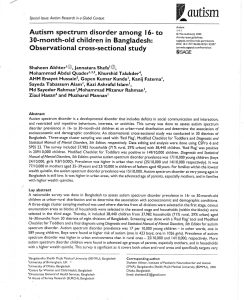
Disability is still widely regarded as a curse and the families of disabled children often feel vulnerable due to negative social attitudes towards these children. The parents, other family members, relatives and even neighbors of a disabled child experience stress to a varying extent. In developing countries like Bangladesh, the strain is even greater. The majority of families live below the poverty level with few resources and very limited access to appropriate services.
Although there are still no authentic statistics on the extent of the disabled and autistic population in Bangladesh, it is generally agreed that about 10% of the population is affected in one way or the other. Among many types of disabilities, the number of physically disabled people constitute about 2-5% of our population. According to this bench figure, it is estimated that there are millions of physically disabled people in Bangladesh today.
Unfortunately most of these people, especially children, do not receive proper service provisions in every sphere of their life. In our country we observe that children who have been suffering from epilepsy, cerebral palsy (CP), autism and other behavioral problems cannot attain the benefits of mainstream educational facilities. The fact is that there exists a lack of knowledge on the part of school management committee (SMC) members, teachers and caregivers who are uncomfortable with enrolling these children since they are not trained to deal with such special cases. Lack of awareness also contributes to a high dropout rate of children who are mildly disabled and/or suffer from mild learning disabilities, as concerned authorities fail to identify these problems.
To meet these challenges, Bangabandhu Sheikh Mujib Medical University started a ‘Child Development and Neurology Service’ as OPD in September 1999 and gradually the OPD flourished with skilled professionals and trained staffs. As facilities for better care have started to materialize, the need for fully equipped facilities in various parts of the country became a necessity. Saima Wazed Hossain – the daughter of Honourable Prime Minister Sheikh Hasina, who is a renowned school psychologist working in Canada also felt that Bangladesh could come forward in this area (Autism and NDDs). She also had a dream for a centre where multi-disciplinary teams will provide comprehensive and tertiary level services to children with disability and their families under one roof. With her inspiration and support from government, we started a centre named Centre for Neurodevelopment and autism in children (CNAC). PM Sheikh Hasina inaugurated CNAC in July 2010 who herself is very keen to work for children with disabilities.
In recent years, we have faced the ever escalating need for better management and skill in the field of autism and to spread awareness among the common people about autism. So we decided that our approach should be multifaceted. With the tireless effort and the help of university authority and several ministries, CNAC has been transformed into an institute. CNAC is now known as the Institute of Paediatric Neurology and Autism (IPNA). IPNA also aims at consolidating research initiatives both at the national and international level and pledges to make all out efforts to be a beacon of hope and inspiration for families and communities around the country who are struggling to cope with autism spectrum disorders.
IPNA will perform the role as a pioneer institution operating on a national level that shall not only provide services in the form of early detection and intervention, but also ensure a ‘safe environment for autistic children’ where they can learn to develop to their full potential. Additionally this institute will also help in disseminating disability/autism related knowledge and other essentials skills for doctors, teachers, and parents.
IPNA is a humanitarian response to address the needs of these underprivileged children. This institute also hopes that it will serve as the main resource centre for the disabled and autistic children in Bangladesh and in the greater South Asian region in the days to come.




 IPNA wants to create a world where children with developmental disabilities and their parents can get their questions answered and their needs met in a caring environment.
IPNA wants to create a world where children with developmental disabilities and their parents can get their questions answered and their needs met in a caring environment.